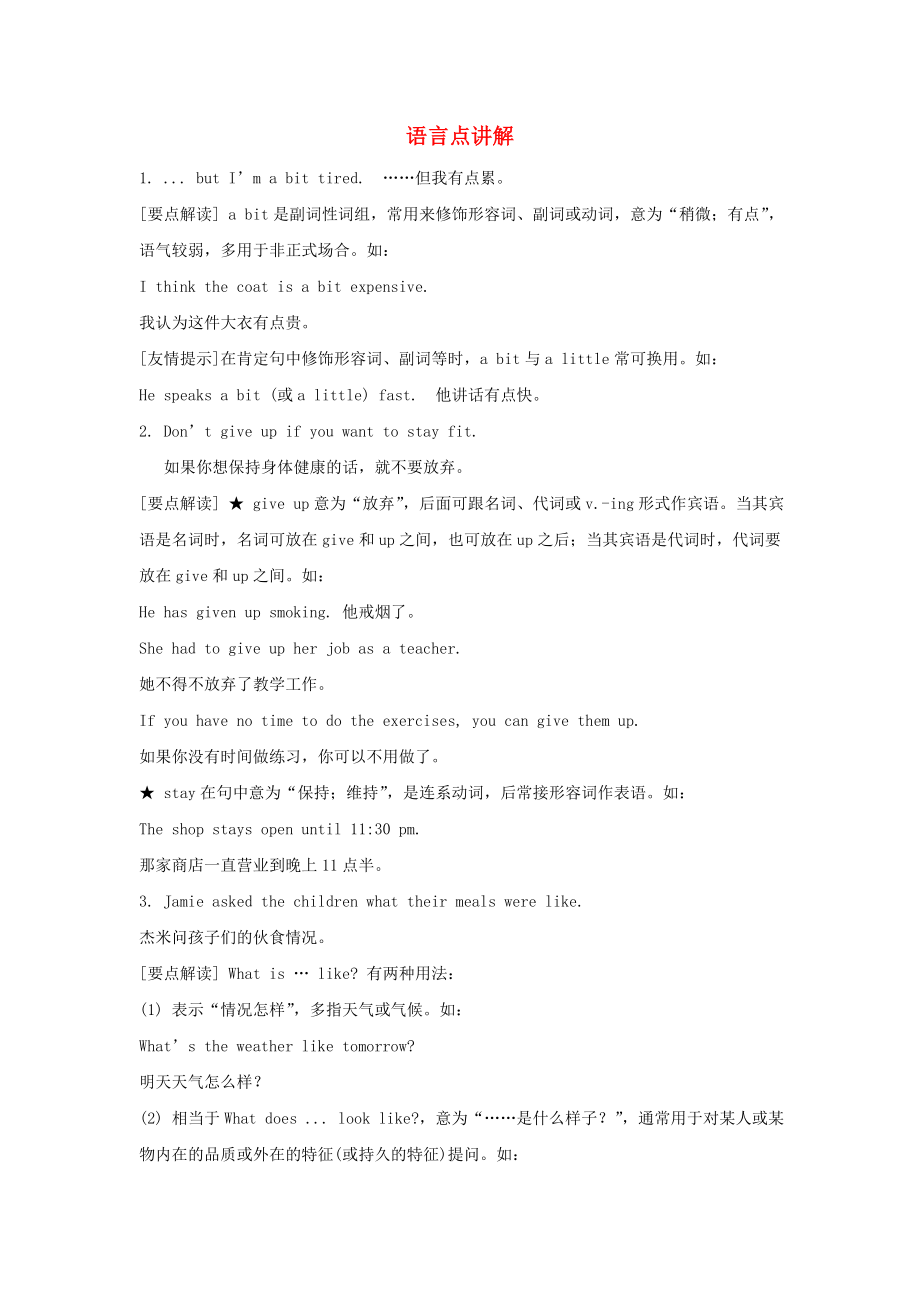《2013年九年級英語上冊 Module 10 Fitness語言點(diǎn)講解 外研版》由會員分享�����,可在線閱讀�����,更多相關(guān)《2013年九年級英語上冊 Module 10 Fitness語言點(diǎn)講解 外研版(2頁珍藏版)》請?jiān)谘b配圖網(wǎng)上搜索���。
1、語言點(diǎn)講解
1. ... but I’m a bit tired. ……但我有點(diǎn)累��。
[要點(diǎn)解讀] a bit是副詞性詞組�,常用來修飾形容詞、副詞或動詞�,意為“稍微�����;有點(diǎn)”,語氣較弱��,多用于非正式場合�����。如:
I think the coat is a bit expensive.
我認(rèn)為這件大衣有點(diǎn)貴��。
[友情提示]在肯定句中修飾形容詞�、副詞等時(shí),a bit與a little?�?蓳Q用��。如:
He speaks a bit (或a little) fast. 他講話有點(diǎn)快���。
2. Don’t give up if you want to stay fit.
如果
2��、你想保持身體健康的話����,就不要放棄�����。
[要點(diǎn)解讀] ★ give up意為“放棄”,后面可跟名詞����、代詞或v.-ing形式作賓語。當(dāng)其賓語是名詞時(shí)����,名詞可放在give和up之間,也可放在up之后�����;當(dāng)其賓語是代詞時(shí)�,代詞要放在give和up之間。如:
He has given up smoking. 他戒煙了����。
She had to give up her job as a teacher.
她不得不放棄了教學(xué)工作。
If you have no time to do the exercises, you can give them up.
如果你沒有時(shí)間做練習(xí)�,你可以不用做了。
3�����、
★ stay在句中意為“保持;維持”�����,是連系動詞�����,后常接形容詞作表語�。如:
The shop stays open until 11:30 pm.
那家商店一直營業(yè)到晚上11點(diǎn)半���。
3. Jamie asked the children what their meals were like.
杰米問孩子們的伙食情況�����。
[要點(diǎn)解讀] What is … like? 有兩種用法:
(1) 表示“情況怎樣”��,多指天氣或氣候����。如:
What’s the weather like tomorrow?
明天天氣怎么樣����?
(2) 相當(dāng)于What does ... look l
4��、ike?���,意為“……是什么樣子?”�,通常用于對某人或某物內(nèi)在的品質(zhì)或外在的特征(或持久的特征)提問。如:
—What is Mr Lin like? 林先生是怎樣一個(gè)人��?
—He is tall and kind. 他個(gè)子高高的����,很善良。
4. Children whose midday meals were unhealthy were difficult to teach in the afternoon.
那些吃不健康午飯的孩子們下午很難教�。
[要點(diǎn)解讀] 主句Children were difficult to teach in the afternoon的句型結(jié)構(gòu)為“s
5、b. / sth. + be + adj. + 動詞不定式”��,其中��,不定式的主動形式表示被動含義�。如:
The work is easy to finish. 工作很容易完成。
5. In the end, when Jamie persuaded them to try his cooking, they liked it!
最后���,當(dāng)杰米說服他們品嘗自己所做的飯菜時(shí)�,他們都很喜歡吃!
[要點(diǎn)解讀] persuade意為“說服”�,后常接不定式的復(fù)合結(jié)構(gòu),即persuade sb. to do sth.����,意為“說服某人做某事”。如:
We persuaded Li Ming to go boating with us in the park.
我們說服了李明和我們一起去公園劃船���。
注意:如果表示“說而不服(即沒有達(dá)到勸說的目的)”,不能用persuade�,而要用try to persuade。如: I tried to persuade my father to give up smoking, but I failed.
我試圖說服我父親戒煙��,可是失敗了�����。
 2013年九年級英語上冊 Module 10 Fitness語言點(diǎn)講解 外研版
2013年九年級英語上冊 Module 10 Fitness語言點(diǎn)講解 外研版

